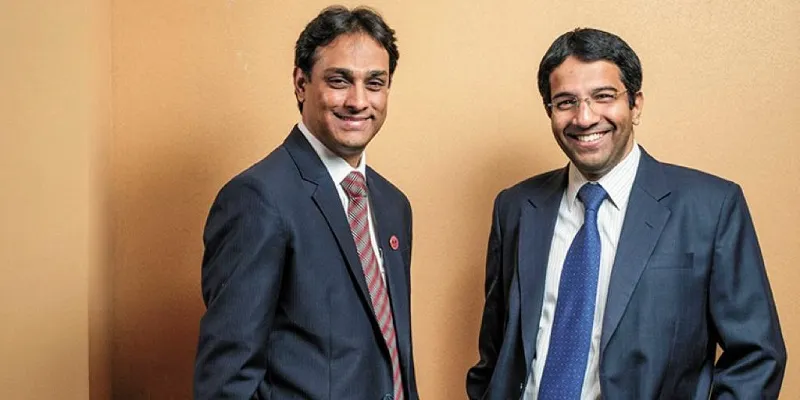How these entrepreneurs started small and became leading Indian brands — our top success stories of SMBs this week
A garage, a small shop, or a family-owned setup — even with humble beginnings, it’s possible to make it big. These Indian entrepreneurs have realised soaring success for their companies with their boundless visions.

Talk about any big brand, and there is invariably a story of great grit and hard work behind its success. SMBStory, this week, covered the journey of a few Indian brands that started small and went on to become leading names in their offered category. Here are their stories.
The Diamond Factory

Gautam Singhvi and Prasanna Shetty, cofounders and Managing Directors, The Diamond Factory
Forty-year-old-entrepreneurs Gautam Singhvi and Prasanna Shetty have been inseparable friends since their school days in Mumbai. Joining the same college, they started organising events, and, realising their flair for management, wished to do something big on their own.
Gautam’s family was in the jewellery business, and the friends thought to leverage the family's expertise, knowledge, and connections. In 1999, the friends started supplying gold coins, chains, and other small orders to wholesalers and retailers.
“Ever since I was in school, I used to go to my father’s jewellery store and observe. The plan was to join the store full-time after graduating from college,” Gautam tells SMBStory.
Gautam joined the business after graduating, and, wanting to modernise the business, mooted the idea of selling diamond jewellery and trying new things.
“These ideas were not possible to execute within the family business as my father was unsure of the expansion plan I had. So, he encouraged me to venture out on my own and try my hand at selling diamond jewellery,” recalls Gautam.
He and Prasanna also experimented with real estate, selling, buying, and investing in property. Says Prasanna, “We were moonlighting as small-time real-estate and jewellery entrepreneurs. Gautam continued to work with his father, and, in our small jewellery wholesale venture, he introduced diamond jewellery. I, meanwhile, did a management course and got into a fulltime corporate job.”
While the duo worked hard at their fulltime gigs, they noticed their friends and family preferred to buy diamond jewellery directly from them rather than from a brand they supplied to. “We realised that retail could be more profitable than our wholesale model,” says Prasanna, adding, “To test this, we set up a boutique diamond jewellery retail outlet in a small garage in Bandra in 2008.”
Seeing their initial promising results, Prasanna quit his job, and the friends came together and deep-dived into this venture.
The Bandra outlet was the first The Diamond Factory (TDF) store, a jewellery brand that has grown into a Rs 75 crore business with 100+ employees in the past 10 years. The brand specialises in retailing diamond and gold jewellery along with guttapusalu, kundan, temple, and uncut jadau jewellery, as well as other intricate hand-crafted pieces in contemporary designs.
Amrut Distilleries

Rakshit Jagdale (right), Managing Director, Amrut Distilleries with Vikram Nikam (left), JMD , Amrut Distilleries
It is May 2019 — a small Indian whisky manufacturer, dwarfed next to contending global liquor giants like Pernod Ricard and Diageo, is eagerly awaiting the jury’s decision at the Bartender’s Whisky Awards in San Francisco.
To the world’s surprise, the Indian brand wins a gold medal that fetes it as the ‘World Whisky Producer of the Year’. It is a moment to celebrate for Amrut Distilleries and the two men who currently run the business, Rakshit Jagdale and Vikram Nikam. For, only 15 years before, the Scots had been highly sceptical about the arrival of a whisky brand from India.
Unfortunately, the celebrations were dampened as Rakshit had lost his father, Neelakanta Rao Jagdale, a fortnight before the ceremony.
Neelakanta Rao Jagdale was the man who had spearheaded the company for 43 years. He had almost single-handedly converted a small liquor business, founded in 1948 on Mysore Road in Bengaluru, into a globally sought-after whisky company by 2009.
“We learnt a lot from my father. It was discipline along with constant and carefully planned experimentation with products that resulted in the Amrut brand becoming a popular name,” says Rakshit, who is now the Managing Director of Amrut Distilleries.
During the first 30 years, the company was supplying liquor to the Indian military, but it was Neelakanta Rao Jagdale who changed the fortunes of the company. By the 80s, the company was known for its IMFL brands MaQintosh whisky and SilverCup brandy.
But, the journey was not easy as Indian whisky was never respected by the Scots, known the world over for their whisky-distilling skills. The Europeans called Indian whisky ‘Indian Made Foreign Liquor’ and never allowed for Indian brands to be called whisky.
In 2001, Neelakanta Rao along with his son, Rakshit, and son-in-law, Vikram Nikam—the team behind NR Jagdale Group subsidiary Amrut—gave Indian craftsmanship a whole new identity, growing it into a brand that came into its own just like global Japanese and American whisky brands.
Ambrane

Ashok Rajpal, Founder and Managing Director, Ambrane
Back in 2001, Ashok Rajpal (39) had been in the textile business for eleven years, when he saw the tech industry booming. Noting a huge growth potential in the demand for peripheral devices, he decided to venture into this nascent industry, though he had no knowledge of it.
Putting his head and fortunes together with his brother, Sanjay Rajpal (36), who already had a small peripheral devices shop in Nehru Place, New Delhi, Ashok began his journey as a retailer of mobile accessories.
Speaking to SMBStory, Ashok says,
“I realised that the world is going to be ‘smart’. And that, if we want to succeed, we must have a business model that revolves around technology.”
Capitalising on a first-mover advantage, the duo founded Ambrane in 2012 with an investment of Rs 10 lakh from their personal savings.
When Ashok entered the business of manufacturing and retailing powerbanks, the smartphone industry was burgeoning, and he saw an untapped opportunity in the powerbank segment. He notes that, back then, the concept of powerbanks was still alien to India, though the product had gained popularity in China and Japan, among other countries.
“People were not aware of the powerbank and its usability, and we thought it would be right to start with it. Also, the demand for powerbanks was bound to increase with that for smartphones. So, in 2014 we set up our manufacturing unit in Kundli, near Sonipat in Haryana, and began manufacturing powerbanks,” says Ashok.
Ambrane started selling its powerbanks through various ecommerce portals including Snapdeal, Flipkart, and ShopClues. However, the product was listed under the category of chargers as there was no specific category available for powerbanks then.
The reception of the startup’s products exceeded all the expectations of the founders. Within three to four days, Ambrane’s powerbanks were stocked out. The success also nudged ecommerce companies to create a new product category on their portals.
Ashok says theirs was one of the first brands to adopt the ‘Make in India’ ethos, long before the movement officially began. After the launch of its power banks, there has been no looking back for the brand.
Today, Ambrane manufactures and sells other mobile accessories and audio products. Its wide range includes speakers, chargers, and rugged cables, apart from powerbanks. The company has a 10-million customer base and records a turnover of Rs 103 cr.
(Edited by Athirupa Geetha Manichandar)









